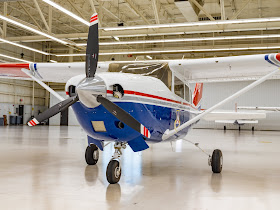lunes, 15 de junio de 2020
RAS Completions sees quick certification of personal protection window
RAS Completions sees quick certification of personal protection window
https://runwaygirlnetwork.com/2020/06/11/ras-completions-sees-quick-certification-of-personal-protection-window/
https://runwaygirlnetwork.com/2020/06/11/ras-completions-sees-quick-certification-of-personal-protection-window/
Honeywell pivots to providing tech to get people flying again
Honeywell pivots to providing tech to get people flying again
https://runwaygirlnetwork.com/2020/06/14/honeywell-pivots-to-providing-tech-to-get-people-flying-again/
https://runwaygirlnetwork.com/2020/06/14/honeywell-pivots-to-providing-tech-to-get-people-flying-again/
El Grupo Iberia y Vueling, pioneras en la aplicación de las recomendaciones de EASA ante la Covid19
- Iberia, Iberia Express y Vueling se han adherido a la Carta de la Aviación ante el Covid19, promovida por la Agencia Europea de Seguridad Aérea
- El objetivo de esta Carta es implementar las recomendaciones de seguridad de EASA y facilitar la recuperación del tráfico aéreo en Europa
- Para las tres aerolíneas la prioridad es ofrecer a sus clientes una experiencia segura, y por eso están aplicando todas las recomendaciones de los responsables de Salud y Seguridad en Europa
Barcelona/Madrid, 14 de junio de 2020
Iberia, Iberia Express y Vueling, referentes en seguridad de las operaciones aéreas, dan un paso más para serlo también en la seguridad frente al Covid19. Con este objetivo, las tres aerolíneas se han adherido a la Carta de la Aviación ante el Covid19, promovida con EASA, y a la que también se ha sumado Aena y toda su red de aeropuertos.
El objetivo de esta Carta es promover la implementación de las recomendaciones de la Agencia Europea de Seguridad Aérea (EASA) y del Centro Europeo para la Prevención y el Control de Enfermedades (ECDC) por parte de aerolíneas y aeropuertos con el fin de facilitar la recuperación del transporte aéreo dentro de la Unión Europea y con el resto del mundo, en un entorno seguro.
Desde el inicio de la pandemia, las compañías del Grupo IAG en España han puesto en marcha todas las medidas de prevención recomendadas por las autoridades, desde información, limpieza y desinfección, equipos de protección, cambios de procedimientos, entre otras. Ahora, de cara al relanzamiento de la actividad a partir del verano, están reforzando todas las medidas para ofrecer a sus clientes una experiencia segura, y para ello la mejor guía son las recomendaciones antes mencionadas.
Además de las medidas que han adoptado las aerolíneas y aeropuertos, a los clientes se les recomienda sacar la tarjeta de embarque en la página web y descargarla en el móvil, a fin de reducir las interacciones en el aeropuerto. También, facturar el equipaje de mano para reducir el contacto a bordo; no deben olvidar las mascarillas de tipo quirúrgico y, por encima de todo, no viajar si están infectados o pueden estarlo.
Las tres aerolíneas del Grupo IAG en España han publicado en sus páginas web un resumen de las medidas que están aplicando, que se pueden consultar en los siguientes enlaces: Iberia, Iberia Express y Vueling.
A su vez, EASA ha publicado sus recomendaciones aquí.
Civil Air Patrol and Textron Aviation Special Missions continue long-standing collaboration
press release
WICHITA, Kan. (June 8, 2020) – Textron Aviation Inc., a Textron Inc. (NYSE:TXT) company, was awarded a contract by the U.S. Civil Air Patrol (CAP) for the sale of 17 Cessna piston engine aircraft. Using fiscal year 2020 funds, the CAP agreed to purchase 11 Skyhawk 172S, five Skylane 182T and one Turbo Stationair HD T206HD aircraft. The aircraft will join a fleet of nearly 550 Cessna aircraft currently owned and operated by the CAP.
“From search and rescue, to disaster relief and homeland security, the missions the CAP undertake daily are as broad as their footprint across the U.S. We are honored that Cessna aircraft continue to be the organization’s platform of choice for these crucial operations,” said Bob Gibbs, vice president, Special Missions Sales. “The Cessna piston aircraft fleet is renowned in general aviation for its operating costs, performance and durability, all important factors for an organization supporting a variety of communities throughout the country.”
As the Air Force Auxiliary, the CAP performs missions for government agencies, and as a non-profit organization they also serve states and communities. In fiscal year 2019, the CAP saved 117 lives and flew nearly 96,000 hours in their Cessna piston fleet. Today, the CAP is the world’s largest Cessna piston operator.
In addition to the just announced contract, in 2019, the CAP ordered 19 aircraft and deliveries of those have begun, with two Turbo Stationair HD pistons already delivered.
Endless Special Missions Possibilities
When government, military and commercial customers want airborne solutions for critical missions, they turn to Textron Aviation. The company’s aviation solutions provide the high performance and flight characteristics required to address the unique challenges of special missions operations. With unparalleled quality, versatility and low operating costs, Textron Aviation products are preferred for air ambulance, ISR, utility transport, aerial survey, flight inspection, training and a number of other special operations.
Iconic Cessna C172 Skyhawk celebrates 65 years since first flight
WICHITA, Kan. (June 12, 2020) – Textron Aviation Inc., a Textron Inc. (NYSE:TXT) company, is honoring the 65th anniversary of the first flight of the most popular single-engine aircraft in aviation history, Textron Aviation’s Cessna Skyhawk. Since the aircraft first took to the sky, more than 45,000 Skyhawks have been delivered to customers around the world—more than any other aircraft in the industry and solidifying the Skyhawk as the aircraft of choice for pilot training.
“On June 12, 1955, the Cessna Skyhawk took to the skies for the first time, paving the way for more than six decades of piston innovation and leadership,” said Chris Crow, vice president of Textron Aviation Piston Sales. “The aircraft quickly established its place as the ultimate training tool, with more than 1,100 built and delivered to customers during its first year of production. We are incredibly proud of the role the Skyhawk plays for many pilots as they successfully take their first solo flight and continue to grow as aviators.”
Throughout its celebrated history, the Skyhawk has remained innovative and updated with the latest avionic technology. In 2019, the aircraft, along with the Cessna high-wing piston fleet, received an addition of new standard and optional equipment as part of the Garmin G1000 NXi next-generation integrated flight deck, which provides pilots with enhanced control and connectivity in the cockpit.
Today, the Skyhawk remains an integral part of Textron Aviation’s pilot outreach efforts with programs like Top Hawk, which enables budding pilots to begin their flying journey. For the past five years, the program has connected student pilots from flight schools and universities across the U.S. with a factory-new Cessna Skyhawk for next-gen flight training. Textron Aviation also donates discovery flights to local community organizations, giving Kansas youth the opportunity to experience the advantages of general aviation firsthand. In 2019, the Textron Aviation Flying Club completed nearly 200 volunteer flights for children and students from the greater Wichita area.
This year, Textron Aviation was awarded a contract by the U.S. Civil Air Patrol (CAP) for 17 Cessna piston engine aircraft, and among the aircraft were 11 Skyhawk 172s. The CAP holds one of the world’s largest fleets of single-engine, piston-powered aircraft--550 in total. More than 500 are Cessna aircraft, used by CAP to save lives, provide disaster relief and emergency services, perform aerial photography reconnaissance and assist with military training.
About the Cessna Skyhawk
The Cessna Skyhawk platform is the world standard for pilot training and is renowned for offering the best combination of modern features, including the leading Garmin G1000 NXi avionics system with wireless connectivity, a standard angle-of-attack display system, and proven dependability.
Spirit AeroSystems Receives $80M Defense Production Act Title III Funding
Press release
Spirit AeroSystems (NYSE: SPR) announced today the Department of Defense (DoD) allocated $80 million to Spirit to expand domestic production capability for advanced tooling, composite fabrication and metallic fabrication. These funds are part of the national response to COVID-19 in support of the Defense Industrial Base.
"We appreciate the confidence our customers have in Spirit's capabilities to serve a variety of critical defense needs," said Duane Hawkins, Senior Vice President; President, Defense and Fabrication, Spirit AeroSystems. "This funding for Spirit provides the Department of Defense additional production capacity for defense needs and helps maintain critical skills in the Defense Industrial Base."
Spirit will utilize the funds to build tooling, fabricate composite parts and machine complex metallic parts at its Wichita, Kan., facility. Spirit designs and manufactures both composite and metallic structures for commercial and defense customers. With long-standing machining capabilities, Spirit crafts more than 3 million detailed parts annually for original equipment manufacturers at peak production. The 5-axis center of excellence in Wichita focuses on large, complex, soft metal parts for fuselage, pylon and wing structures, all built on high-tech, high-speed, latest-generation equipment and is part of 12M sqft of manufacturing space.
"Our growing work on defense programs has provided a measure of stability for the company, and helped us as we shift capacity to serve other needs, particularly in the defense market," said Hawkins. "These funds under Title III will help retain employees with critical skills."
Spirit supports a number of military programs, including programs for the U.S. Air Force, the U.S. Navy, the U.S. Marine Corps and the U.S. Army.
Defense Production Act Title III contracts support the Defense Industrial Base and use funds authorized and appropriated under the CARES Act.
Spirit AeroSystems (NYSE: SPR) announced today the Department of Defense (DoD) allocated $80 million to Spirit to expand domestic production capability for advanced tooling, composite fabrication and metallic fabrication. These funds are part of the national response to COVID-19 in support of the Defense Industrial Base.
"We appreciate the confidence our customers have in Spirit's capabilities to serve a variety of critical defense needs," said Duane Hawkins, Senior Vice President; President, Defense and Fabrication, Spirit AeroSystems. "This funding for Spirit provides the Department of Defense additional production capacity for defense needs and helps maintain critical skills in the Defense Industrial Base."
Spirit will utilize the funds to build tooling, fabricate composite parts and machine complex metallic parts at its Wichita, Kan., facility. Spirit designs and manufactures both composite and metallic structures for commercial and defense customers. With long-standing machining capabilities, Spirit crafts more than 3 million detailed parts annually for original equipment manufacturers at peak production. The 5-axis center of excellence in Wichita focuses on large, complex, soft metal parts for fuselage, pylon and wing structures, all built on high-tech, high-speed, latest-generation equipment and is part of 12M sqft of manufacturing space.
"Our growing work on defense programs has provided a measure of stability for the company, and helped us as we shift capacity to serve other needs, particularly in the defense market," said Hawkins. "These funds under Title III will help retain employees with critical skills."
Spirit supports a number of military programs, including programs for the U.S. Air Force, the U.S. Navy, the U.S. Marine Corps and the U.S. Army.
Defense Production Act Title III contracts support the Defense Industrial Base and use funds authorized and appropriated under the CARES Act.
Spirit Admits To Apparent New Interruptions In 737 MAX Production
Update on Spirit's 2020 737 MAX Production
WICHITA, Kan., June 10, 2020 /PRNewswire/ -- On June 4, 2020, Spirit AeroSystems [NYSE: SPR] received a letter from Boeing directing Spirit to pause additional work on four 737 MAX shipsets and avoid starting production on sixteen 737 MAX shipsets to be delivered in 2020, until otherwise directed by Boeing, in order to support Boeing's alignment of near-term delivery schedules to its customers' needs in light of COVID-19's impact on air travel and airline operations, and in order to mitigate the expenditure of potential unnecessary production costs.
Based on the information in the letter, subsequent correspondence from Boeing dated June 9, 2020, and Spirit's discussions with Boeing regarding 2020 737 MAX production, Spirit believes there will be a reduction to Spirit's previously disclosed 2020 737 MAX production plan of 125 shipsets. Spirit does not yet have definitive information on what the magnitude of the reduction will be but expects it will be more than 20 shipsets.
The 737 MAX grounding coupled with the COVID-19 pandemic is a challenging, dynamic and evolving situation. During this time, Spirit plans to work with Boeing to determine a definitive production plan for 2020 and manage the 737 MAX production system and supply chain.
Due to the matters described above, Spirit has elected to place certain Wichita hourly employees directly associated with production work and support functions for the 737 MAX program on a 21 calendar day unpaid temporary layoff/furlough effective Monday, June 15. In addition, Spirit will declare an immediate reduction of the hourly workforce in Tulsa and McAlester, Okla., effective Friday, June 12.
Spirit remains a proud partner on the 737 MAX program and looks forward to working with Boeing to ensure the long-term success of the program.
Wisk Resumes Flight Testing with Self-Flying Air Taxi
All-electric, eVTOL aircraft, Cora, returns to flight in the U.S. and New Zealand
MOUNTAIN VIEW, CA AND WELLINGTON, NEW ZEALAND – – Wisk, the Urban Air Mobility (UAM) company behind the world’s first all-electric, self-flying air taxi, Cora, announced today that it has resumed flight testing in both the U.S. and in New Zealand.
The flight tests will evaluate the performance of the aircraft in a real world environment, while collecting data that will help inform the further development, operation, safety features and certification of the aircraft.
“We are excited to resume test flights following a brief pause due to COVID-19,” said Gary Gysin, CEO of Wisk. “The team’s dedication over the past few months has allowed us to remain focused on critical non-flight areas, such as certification, software development, and operations. This has allowed us to maintain momentum during this unique time. But it’s awesome to be flying again.”
Flight tests had been temporarily paused due to shelter-in-place restrictions resulting from the Coronavirus pandemic. Prior to the pandemic, the company had completed more than 1300 test flights expanding the flight envelope, providing data for model, design, and requirements updates, and maturing procedures to operate the aircraft safely and efficiently.
“Our first priority has always been safety, both for our employees and in the development of our aircraft,” said Carl Engel, Director, Flight Test for Wisk. “As we return to flight testing, we have implemented a number of procedures and social distancing measures based on best practices and recommendations from local and national health and government organizations.”
About Wisk
Wisk is an urban air mobility company dedicated to delivering safe, everyday flight for everyone. Cora, its self-flying, eVTOL (electric vertical takeoff and landing) air taxi, will make it possible for passengers to skip the gridlock traffic and get to their destination faster. Based in the San Francisco Bay Area and New Zealand, Wisk is an independent company backed by The Boeing Company and Kitty Hawk. With a decade of experience and over 1000 test flights, Wisk is set to shape the future of daily commutes and urban travel, safely and sustainably.
For more information, visit: wisk.aero
Astrobotic Awarded $199.5 Million Contract to Deliver NASA Moon Rover
https://youtu.be/S9Y6n1G5hhc
Astrobotic’s Griffin lunar lander to carry the NASA VIPER mission to the south pole of the Moon in 2023, as a precursor to a human landing
Pittsburgh, PA – Astrobotic, the world’s leading lunar logistics service provider, has been selected by NASA to deliver the Volatiles Investigating Polar Exploration Rover, or VIPER, to the south pole of the Moon in 2023.
Astrobotic will provide an end-to-end delivery for VIPER on board the company’s Griffin lunar lander through a $199.5 million contract awarded under the NASA Commercial Lunar Payload Services program, or CLPS. Griffin’s delivery of VIPER will be Astrobotic’s second CLPS delivery, following the company’s Peregrine lander delivery in 2021. In addition, Astrobotic’s MoonRanger rover was previously selected by NASA for delivery to the Moon in 2022 on the lander of another CLPS partner.
The Griffin lunar lander is Astrobotic’s medium capacity lander product line, and is capable of delivering up to 500 kg of mass to the lunar surface. Griffin uses many of the same subsystems and approaches employed by the Peregrine lander, which will fly two years before VIPER. Both lander product lines put a heavy emphasis on safe and reliable delivery of customer payloads to the Moon.
When VIPER disembarks from Griffin’s ramps onto the Moon, it will survey the surface and subsurface for water ice, which could be used for breathable air and rocket propellant by future deep space explorers. VIPER’s mapping of lunar water ice could be the first step toward utilizing resources in the space environment – rather than carting them all from Earth – to enable more affordable and sustainable space exploration.
“It is an enormous honor and responsibility to be chosen by NASA to deliver this mission of national importance,” said Astrobotic CEO John Thornton. “Astrobotic’s lunar logistics services were created to open a new era on the Moon. Delivering VIPER to look for water and setting the stage for the first human crew since Apollo embodies our mission as a company.”
Podcast Pilotando el tema: Episodio 7. De dudas, picas y drones rebeldes
En este episodio número siete se tratan las dudas que los pasajeros con menos conocimientos de aviación han preguntado, así como una pequeña introducción a los Tercios y un par de anécdotas históricas, un bombardeo en Vietnam un tanto peculiar, y un drone de los años 40 que salió rebelde.
Además se puede encontrar el podcast en:










